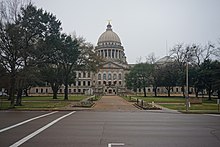Jessie Lee Garner

Jessie Lee Garner was a African American woman who, in the depths of Jim Crow, successfully sued the municipal bus company of Jackson, Mississippi over being attacked by a white man seeking her seat in the colored section of the bus. An all-white jury awarded her damages of $1,000 (about $22,000 in 2024 dollars) — a rare legal victory for a Black citizen of the American South in the white supremacist courts of the period.[1][2]
Bus attack[edit]
On August 31, 1936, Garner was six months pregnant and waiting for a bus outside Sutton's Ice Cream Parlor in Jackson. When it arrived, Garner took a seat in the section of the bus reserved for African Americans. As the bus followed its route, the white section of the bus became crowded, with all seats taken.[2][1]
Outside the Edwards Hotel in downtown Jackson, a young white man walked back to the African American section of the bus and, "with rude and profane language," ordered Garner to stand up and give him her seat in the colored section. Garner responded by noting her pregnancy but saying she would in any event be exiting the bus shortly at Farish Street. The man punched her twice in the head, knocking her to the bus floor, knocking out several pieces of dental work and leaving her eyes badly swollen. She suffered a miscarriage soon thereafter and was bedridden from August 31 until mid-November.[2][3]
Court case[edit]
Garner sued the Mississippi Power & Light Company (today part of Entergy), claiming negligence. Mississippi's Jim Crow laws mandated that buses, like trains, have "by a partition or adjustable screen...so as to secure separate accommodations for the white and colored races." Mississippi statute required "a partition constructed of metal, wood, strong cloth or other material."[4][2][3]
Garner argued that if the bus had had a physical partition — as opposed to simply a small tin sign labeling the sections for each race — the assault would not have occurred. The bus company, one of Garner's three white attorneys would write, knew that the lack of a partition "would very probably result in the injury to law-abiding, peaceable colored persons who were passengers on its buses, and that the proximate cause of the injury suffered by appellee was the failure of the power company to comply with the law, which directed them to separate the races."[5][6]
Rather than attack the constitutionality of Jim Crow, her lawyers' strategy — in front of an all-white jury — was instead to accept it as a set of laws meant to preserve peace between the races and to appeal to "the paternalist sentiments of the jurors."[2] The approach succeeded. The jury awarded Garner $1,000, both for her medical expenses and because she had "suffered great pain and mental anguish."
Mississippi Power & Light appealed the verdict to the Supreme Court of Mississippi, arguing that the lack of a partition was not the proximate cause of the attack. But on October 18, 1937, the Supreme Court affirmed the lower court decision.[1][2][6] In its decision, Justice George H. Ethridge wrote that the "object of the law in requiring separation of the races...is to avoid outbreaks and conflicts which mar the public peace."[3]
See also[edit]
- Apartheid
- Black Codes in the United States
- Jim Crow economy
- List of Jim Crow law examples by state
- Racial segregation in the United States
- Racism in the United States
- Second-class citizen
- Timeline of the civil rights movement
References[edit]
- ^ a b c Krupnick, Max J. (7 December 2023). "Break Every Chain: How black plaintiffs in the Jim Crow South sought justice". Harvard Magazine. Retrieved 26 May 2024.
- ^ a b c d e f Eatmon, Myisha Shuntez (September 2020). "Public Wrongs, Private Rights: African Americans, Private Law, and White Violence during Jim Crow". Northwestern University. Retrieved 26 May 2024.
- ^ a b c "MISSISSIPPI POWER LIGHT CO. v. GARNER, 179 Miss. 588". CaseMine. Retrieved 26 May 2024.
- ^ "Excerpt from Mississippi code of 1930 of the Public Statue Laws, 1933". W. E. B. Du Bois Papers. Retrieved 26 May 2024.
- ^ Record in Mississippi Power and Light Company v. Garner, "Brief for Appellee," 4, Supreme Court Case Files, Mississippi Department of Archives and History.
- ^ a b "Mississippi Power & Light Co. v. Garner". vLex. Retrieved 26 May 2024.
